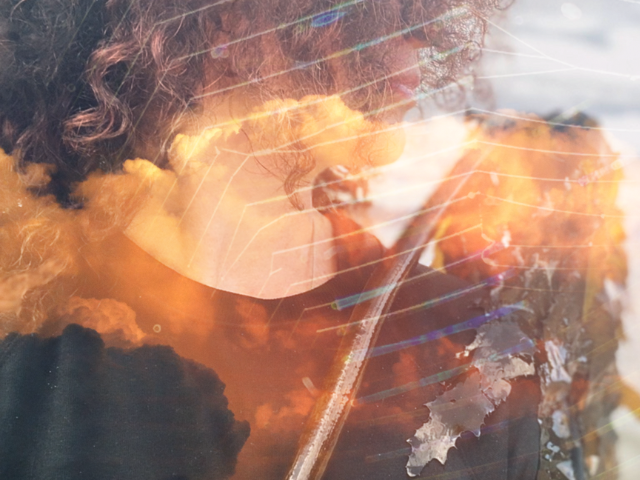PROJECT // KÔIWI/KIWÊ
KÔIWI/KIWÊ is the ongoing process of interdisciplinary, intercultural performance work, co-directed by Mâori choreographer, dancer and director Victoria Hunt, and Métis sound designer, vocalist and performer Moe Clark. The work presents a continuum of investigation that Hunt has been engaged in for more than a decade, centered on the return of Hinemihi, her ancestral spirit-house (Marae) acquired by the governor general of NZ and shipped to England as a souvenir in 1890. Hinemihi is a grandmother ancestor, and her carved door lintel (her pelvis) is in an auction house in Paris, valued at 3 million US$. For Hunt, performing her role as custodian is fundamental to her roles as an artist and activist, and the lineages she embodies in her creative process. For Moe, as a 2Spirit Métis artist, whose relatives have been continually displaced from their homelands, and whose ceremonial and creative processes were forced underground for years, acts of “rematriation” and cultural resurgence are fundamental to her role as a living storyteller. Moe’s work emphasizes land-based creation, Indigiqueer resurgence, intergenerational transmission through language reclamation and song creation. The performance collaboration that is KÔIWI/KIWÊ tethers to these multilayered spheres of creation and represents a powerful coming together of creative lineages and cultural continuums.
KÔIWI/KIWÊ presents the body as an intensified ontological site, a call and response across time, distance and dimensions, in a reciprocal re-imagining. Fundamental to this proposal is the aspiration to articulate how Indigenous knowledge can oscillate in the physical form of living bodies while being amplified through new technologies, to invoke a multiplicity of spirit, and activate Indigiqueer future imaginaries.
Weather Beings is a performance collaborative co-founded by Moe Clark and Victoria Hunt in 2019. Weather Beings was created as a site to examine the intersections of Métis wâhkôhtowin and Mâori whakapapa (kinship systems), and to assert a critical position to reclaim, restore and repatriate feminine and queer knowledge into our cultural and creative practices. As collaborators, we navigate thresholds between what is ‘known’, what is withheld or ‘unknown,’ and what is being dreamt into being, while upholding a framework of ethical co-existence and restorative co-resistance. In essence, we activate creative practices that refuse violent linearities by dreaming backwards into the future. Encoded in this dreaming are nêhiyawêwin and Te Reo Mâori languages, where old words create new worlds.
BIO// Victoria Hunt is an Indigenous-Maori artist whose creative journey encompasses a diverse range of artistic disciplines. In addition to being a dancer, choreographer and director, her artistic practice reaches into photography and filmmaking. Born on the ancestral lands of Kombumerri and Yugambeh Country in Queensland, she currently resides on the unceded Bidjigal Country in Maroubra, known as the place of Thunder, within EORA Sydney. Victoria’s ancestral affiliations include Ngati Ohomairangi-Te Arawa, Rongowhaakata, Kahungunu Maori as well as Pakeha-Irish, English, and Finnish lineages.
Victoria’s artistic practice emerges from the intersection of Indigenous epistemologies and diasporic concepts of identity formation and belonging. Her work is liminal, traversing intercultural and interdisciplinary realms whilst reclaiming the power of Indigenous creativity within the context of Rematriation. By inserting the body into frameworks of power, Victoria calls backwards in a reciprocal reimagining for future ancestors. Her practice is rooted in principles of Whakapapa, which honors the interconnectedness of kinship and genealogies. Drawing insight from Mana Atua Wahine, the feminine principle that carries sacred energy, she explores the interplay between Body Weather philosophy and IndigiQueer perspectives within the creation process. Her work is a gradual binding of collective knowledge and perceptions between artists, Elders, Tūpuna and communities.
Victoria is a founding member of the De Quincey Co, Australia’s renowned Body Weather dance company and contributed to over 40 productions. With an international presence, Victoria has collaborated with renowned artists and performed on prominent stages worldwide. Notable among these is performing in “Requiem” with MAU. With the work “Day of Invigilation”, created in collaboration with Brian Fu’ata and Barbara Campbell, they stopped right here in Montreal at Indigenous Creators Exchange/ Scène Contemporaine Autochtone at Festival TransAmeriques Arts Centre in Montreal in 2018.
Victoria, dancer, choreographer and director, also extends her artistic reach into photography and filmmaking.
âpihtawikosisâniskwêw (Métis / Norwegian / French / British) multidisciplinary artist Moe Clark is a 2Spirit singing thunderbird. She works across disciplines of vocal improvisation, sound design, spoken word poetry and performance creation to create work that centers embodied knowledge, Indigenous futurities, and creative kinship. Hailing originally from the prairies in Treaty 7, Moe has resided as a guest in Tio’tiá:ke/ Mooniyang/ Montréal for more than a decade.
Moe’s last solo album “Within” toured across North America and her collaborative video poem “nitahkôtân” won best Indigenous language music video at the ImagiNative film festival. In 2013 she directed the 10th Annual Canadian Festival of Spoken Word, highlighting Indigenous Languages, and she was named Poet of Honour at the same festival the following year.
As a composer, Moe’s music and voice have appeared in documentaries, films, theater and dance performances alike such as O’Bomsawin’s 2018 CBC documentary “Du teweikan à l’électro” alongside Shauit and Pakesso Mukash. In 2020, she was the musical director for the acclaimed “kiciweok: les 13 mots autochtones” directed by Onishka Productions, featuring artists Tomson Highway and Josephine Bacon.
Apart from performance, Moe facilitates creative workshops with Indigenous youth in lockdown facilities and remote communities and she collaborated with Land as Our Teacher project to bridge urban Indigenous youth with cultural teachers and inclusive land-based education. In 2016 Moe launched nistamîkwan: a transformational Indigenous arts organization with an emphasis on intercultural, interdisciplinary and intergenerational collaboration. The land-based nêhiyawêwin (Cree language) songwriting project with artists and knowledge keepers Cheryl L’Hirondelle and Joseph Naytowhow will be released in a full-length album in 2024. Through creative continuums of Indigenous language resurgence, sound experimentation and ceremonial practice, her work in community reinforces the roles of 2S people and intergenerational transmission.

